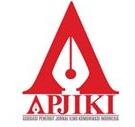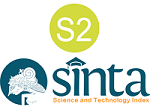The role of public relations education and students’ self-efficacy on career aspiration
Abstract
Background: Studies on career readiness and aspiration are crucial for educational establishments to assess how well the education of students influences their self-efficacy. Progress in the Public Relations (PR) profession relies on the successful education of PR academic institutions. Purpose: This study examined the PR students’ self-efficacy by identifying two variables: confidence in their Public relations abilities and skills and confidence in their knowledge of PR. The study then looks at how these predictors affect their career readiness. Methods: Using hierarchical regression, this study looks at the effect of two vital predictors of confidence in PR abilities, skills and knowledge on PR on career readiness. Aside from the two predictors, the demographical characteristics and additional predictors of whether the students have experienced job internships and are currently active in the student association were also examined. The data was analysed using a sample of 139 students from Universitas Padjadjaran. Results: From the regression models, students’ self-efficacy significantly influences career readiness, while having internship experience and being active in student associations are also positively associated with career readiness, although not statistically significant. Demographic characteristics do not have a statistically significant influence on career readiness. Conclusion: This study highlights the non-existent impact of demographic factors on students’ self-efficacy and career readiness while providing underpinnings for future research on self-efficacy. Implication: Although the results may not necessarily reflect similar circumstances in similar settings for other establishments, for the specific context of Universitas Padjadjaran, this study provides data-driven evidence on the role of PR education in the students’ self-efficacy and how they perceive their career aspirations in the future.
Keywords
Full Text:
PDFReferences
Alfaiz, A., Hidayat, H., Yandri, H., Lidya Sari, A. T., Sendayu, F. S., Suarja, S., & Arjoni, A. (2021). Identification of perceived self-efficacy to predict student’s awareness in career readiness. Islamic Guidance and Counseling Journal. https://doi.org/10.25217/igcj.v4i1.933
Andini, D. S., & Lukito, H. (2022). The effect of emotional intelligence, and social support on career readiness with self-efficacy career readiness as mediation variables. Almana Jurnal Manajemen Dan Bisnis. https://doi.org/10.36555/almana.v6i3.1951
Ballout, H. I. (2009). Career commitment and career success: moderating role of self‐efficacy. Career Development International. https://doi.org/10.1108/13620430911005708
Bandura, A. (Ed.). (1995). Self-efficacy in Changing Societies. Cambridge University Press.
Berger, N., Hanham, J., Stevens, C. J., & Holmes, K. (2019). Immediate feedback improves career decision self-efficacy and aspirational alignment. Frontiers in Psychology. https://doi.org/10.3389/fpsyg.2019.00255
Bi, Y. (2023). The relationship between professional self-concept and career decision-making difficulties among postgraduate nursing students in china: the mediating role of career decision-making self-efficacy. Frontiers in Psychology. https://doi.org/10.3389/fpsyg.2023.1198974
Briones, R., & Toth, E. L. (2013). The state of pr graduate curriculum as we know it. Journalism & Mass Communication Educator. https://doi.org/10.1177/1077695813481463
Choirudin, C., Sudana Degeng, I. N., Kuswandi, D., Purnomo, P., & Maba, A. P. (2022). Career readiness among low-income muslim students. International Journal of Evaluation and Research in Education (Ijere). https://doi.org/10.11591/ijere.v11i3.22727
Cohen, J. (1988). Statistical power analysis for the behavioral sciences second edition (2nd ed.). Lawrence Erlbaum Associates.
Creed, P. A., Buys, N. J., Tilbury, C., & Crawford, M. J. (2013). The relationship between goal orientation and career striving in young adolescents. Journal of Applied Social Psychology. https://doi.org/10.1111/jasp.12108
Demidov, V., Mokhorov, D., Mokhorova, A., & Semenova, K. (2020). Professional public accreditation of educational programs in the education quality assessment system. Humanities & Social Sciences Reviews. https://doi.org/10.18510/hssr.2020.84104
Farmer, B., Perry, L., & Ha, I. (2016). University-community engagement and public relations education: a replication and extension of service-learning assessment in the public relations campaigns course. International Journal of Research on Service-Learning and Community Engagement. https://doi.org/10.37333/001c.29623
Faul, F., Erdfelder, E., Buchner, A., & Lang, A. G. (2009). Statistical power analyses using G*Power 3.1: Tests for correlation and regression analyses. Behavior Research Methods, 41(4), 1149–1160. https://doi.org/10.3758/BRM.41.4.1149
Gushue, G. V, L. Scanlan, K. R., Pantzer, K. M., & Clarke, C. P. (2006). The relationship of career decision-making self-efficacy, vocational identity, and career exploration behavior in African American High School Students. Journal of Career Development. https://doi.org/10.1177/0894845305283004
Gushue, G. V, & Whitson, M. L. (2006). The relationship among support, ethnic identity, career decision self-efficacy, and outcome expectations in African American High School Students. Journal of Career Development. https://doi.org/10.1177/0894845306293416
Kim, B., Jang, S. H., Jung, S. Y., Lee, B. H., Puig, A., & Lee, S. M. (2014). A moderated mediation model of planned happenstance skills, career engagement, career decision self‐efficacy, and career decision certainty. The Career Development Quarterly. https://doi.org/10.1002/j.2161-0045.2014.00070.x
Lee, C.-C. (2022). Scaffolding students’ career readiness via the e‐micromodule route. Journal of Employment Counseling. https://doi.org/10.1002/joec.12191
Lukman, S., Rizal, I., & Tiara, O. (2023). Graduate income and profession linkage: Tracer study of public relations graduates. PRofesi Humas Jurnal Ilmiah Ilmu Hubungan Masyarakat, 7(2), 234. https://doi.org/10.24198/prh.v7i2.42355
Mao, C.-H., Hsu, Y.-C., & Fang, T.-W. (2016). Mediating effect of career decision self-efficacy on the relationship between parental support and indecision in Taiwan. Journal of Career Development. https://doi.org/10.1177/0894845316663319
Newsom, J. T. (2021). Sample size and power for regression. Multiple Regression and Multivariate Quantitative Methods.
Nik Yusoff, N. R. (2024). Effects of career readiness module on career self-efficacy among University Students. International Journal of Evaluation and Research in Education (Ijere). https://doi.org/10.11591/ijere.v13i1.25257
Rahmat, A. (2016). Peta luaran lembaga pendidikan komunikasi (Studi Pada Program Ilmu Komunikasi Universitas Padjadjaran). PRofesi Humas, 1(1), 53–64. https://doi.org/10.24198/prh.v1i1.9221
Ramadhani, S., & Puji Lestari. (2021). How proactive personality mediates the relationship between parental involvement and career decision self-efficacy. Psychology and Education Journal. https://doi.org/10.17762/pae.v58i2.1063
Ramasamy, R., & Nithyanandan, D. V. (2016). Positive psychological factors of career development among Undergraduate Students. International Journal of Indian Psychology. https://doi.org/10.25215/0304.057
Serdar, C. C., Cihan, M., Yücel, D., & Serdar, M. A. (2021). Sample size, power and effect size revisited: simplified and practical approaches in pre-clinical, clinical and laboratory studies. Biochem Med. https://doi.org/10.11613/BM.2021.010502
Shin, J., & You, S. Y. (2021). The mediating effect of self-efficacy in the relationship between communication skills and practices of preventing infectious diseases among daycare center teachers in South Korea. Child Health Nursing Research. https://doi.org/10.4094/chnr.2021.27.1.56
Sholikah, M., Muhyadi, M., Indartono, S., Kenzhaliyev, O. B., & Kassymova, G. K. (2021). Self-efficacy and student achievement for enhancing career readiness: the mediation of career maturity. Jurnal Pendidikan Teknologi Dan Kejuruan, 27(1). https://doi.org/10.21831/jptk.v27i1.35657
Sinring, A., & Fadhilah, N. (2023). Other people in career choice influence career self-efficacy and individual career self-management. European Journal of Educational Research. https://doi.org/10.12973/eu-jer.12.2.1045
Solikhah, R. N. (2014). Persepsi orang tua terhadap pendidikan seks pada anak usia dini di Desa Tawang Kecamatan Weru Kabupaten Sukoharjo. Universitas Muhammadiyah Surakarta.
Xu, M. (2023). Research on the impact of basic psychological needs satisfaction on career adaptability of Chinese College Students. Frontiers in Psychology, 14. https://doi.org/10.3389/fpsyg.2023.1275582
DOI: https://doi.org/10.24198/prh.v9i2.59571
Refbacks
- There are currently no refbacks.
Copyright (c) 2025 Syauqy Lukman, Aang Koswara, Anwar Sani

This work is licensed under a Creative Commons Attribution-NonCommercial-ShareAlike 4.0 International License.
PRofesi Humas Indexed by:



 Editorial Office of PRofesi Humas: Faculty of Communication Science, Universitas Padjadjaran
Editorial Office of PRofesi Humas: Faculty of Communication Science, Universitas PadjadjaranJl. Raya Bandung-Sumedang Km. 21 Jatinangor, Sumedang, Indonesia 45363
WA: +6282316731181 (Chat Only) Telephone: +62227796954
Faxmile: +62227794122
Email: jurnal.profesihumas.fikom@unpad.ac.id
PRofesi Humas Supervised by:

 View My Stats
View My Stats








